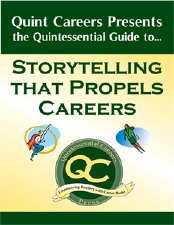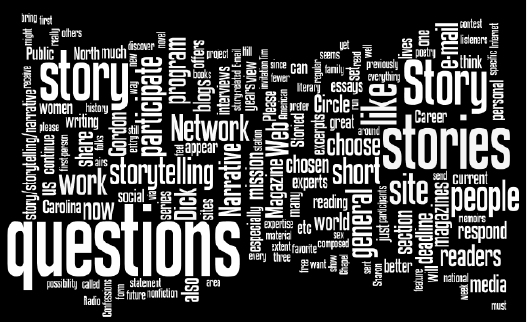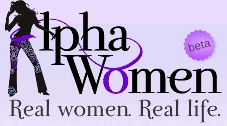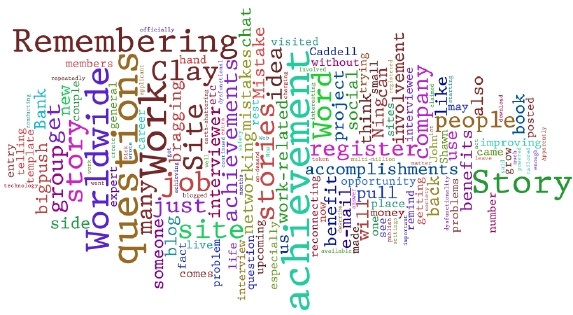
I’m really excited about a project I have going on this summer. I’m conducting (via e-mail) five-question interviews with some of the best-known folks in both applied and performance storytelling.
Seventeen practitioners have already responded to the Q&A: Molly Catron, Terrence Gargiulo, Jon Hansen, Loren Niemi, Gabrielle Dolan, John Caddell, Shawn Callahan, David Vanadia, Svend-Erk Engh, Sharon Lippincott, Tom Clifford, Ardath Albee, Sharon Benjamin, Carol Mon, Ron Donaldson, Jessica Lipnack, and Stephanie West Allen.
Among others who’ve agreed to participate are Annette Simmons, Christina Baldwin, Tim Sheppard, Michael Margolis, Victoria Ward, Steve Lovelace, Sally Strackbein, Thom Haller, Karen Dietz, Tim Enerata, Eric Wolf, Erin Fogarty, Rick Stone, David Drake, Nicky Fried, Cynthia Kurtz, and Kathleen Golden.
I sent invitations to these folks and others, but if you are reading this, did not receive an invitation, and would like to participate, please read the extended entry for details, as well as the set of “general questions” that participants have been asked to choose from. (Each interviewee also gets two questions composed for his or her special area of expertise.) Please e-mail me if you’d like to participate or drop me a note in the Comments.
The Invitation
I am initiating a series of short, 5-question interviews to appear on A Storied Career.
This planned series is modeled on a long-running and successful Q & A series with career experts.
Experts respond to the questions via e-mail.
A Storied Career does not yet generate a huge amount of traffic, but it does offer a Google Page Rank of 7.
I would love to have you participate, and if you agree, you’ll choose 5 questions from 2 sets of questions — 10 general story/storytelling questions (these appear below), from which you can choose 3 to respond to, and 2 questions chosen specifically for you and your particular area of story expertise/practice (e-mail me for these 2, and I’ll send the questions once you confirm your interest).
I’d also appreciate your suggestions for other experts who might like
to participate.
Thank you so much for considering this possibility,
What participants receive if they accept the invitation:
Below you will find general questions. Please choose and respond to THREE questions from the list of 10 general questions.
E-mail me for questions specific to you, and then please respond to BOTH of the questions chosen especially for you.
If you prefer, you can CHOOSE ANY COMBINATION OF 5 QUESTIONS from the general questions and the questions chosen especially for you.
There is NO set deadline for this Q&A; however, some people work better with the pressure of a deadline. If that’s you, let’s set Aug. 15 as the deadline as I would like to launch this feature in September 2008 and will likely run a Q&A weekly.
I would also like to run a short bio-blurb highlighting your current project(s) (books, Web sites, etc.), and/or if you prefer, this promotional material could appear in the form of an advertisement. Please also send a photo of yourself, preferably in .jpg or .gif format.
The Q & A will remain archived on A Storied Career, both in the regular entry archives and in the Story Practitioners section, where visitors can continue to view your expertise.
Thank you again very much for your participation.
Ten General Questions:
1. How did you initially become involved with story/storytelling/narrative? What attracted you to this field? What do you love about it?
2. The storytelling movement seems to be growing explosively. Why now? What is it about this moment in human history and culture that makes storytelling so resonant with so many people right now?
3. What people or entities (such as Web sites, blogs, books, organizations, conferences, etc.) have been most influential to you in your story work and why?
4. How important is it to you and your work to function within the framework of a particular definition of “story?” (i.e., What is a story?) What definition do you espouse?
5. The culture is abuzz about Web 2.0 and social media. To what extent do you participate in social media (such as through LinkedIn, MySpace, Facebook, Twitter, YouTube, Second Life, blogs, etc.)? To what extent and in what ways do you feel these
venues are storytelling media?
6. If you could identify a person (such as a celebrity) or organization who desperately needs to tell a better story, who or what would it be?
7. Are there any current uses of storytelling that repel you or that you feel are inappropriate?
8. What future trends or directions to do foresee for story/storytelling/narrative? What’s next for the discipline? AND/OR What future aspirations do you personally have for your
own story work? What would you like to do in the story world that you haven’t yet done?
9. What’s your favorite story about a transformation that came about through a story or storytelling act?
10. If you could share just 1 piece of advice or wisdom about story/storytelling/narrative with readers, what would it be?
E-mail me for questions composed especially for you and your specific work.
 I was pretty much past the hands-on mothering stage by the time I entered my PhD program in 2003 as my kids were almost grown and one was already out of the house.
I was pretty much past the hands-on mothering stage by the time I entered my PhD program in 2003 as my kids were almost grown and one was already out of the house.







